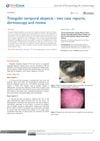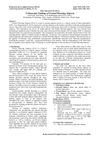2 citations,
July 2019 in “Indian dermatology online journal” A 17-year-old girl and her brothers have a rare hair condition with long eyelashes, thick eyebrows, and easily pluckable hair.
 2 citations,
March 2019 in “Journal of Dermatology”
2 citations,
March 2019 in “Journal of Dermatology” Trichoscopy helped diagnose and treat a woman with two different types of hair loss.
 2 citations,
February 2018 in “Journal of dermatology & cosmetology”
2 citations,
February 2018 in “Journal of dermatology & cosmetology” Triangular temporal alopecia is a benign hair loss pattern best diagnosed with dermoscopy, with limited treatment options like surgery and hair transplantation.
 2 citations,
June 2017 in “Pediatric Dermatology”
2 citations,
June 2017 in “Pediatric Dermatology” A critically ill boy experienced hair loss likely due to the stress of his medical treatments, but his hair regrew completely in 1.5 months.
 2 citations,
January 2017 in “Przegla̧d dermatologiczny”
2 citations,
January 2017 in “Przegla̧d dermatologiczny” Two trichoscopic patterns found in hair loss: diffuse fibrotic and androgenetic alopecia, affecting treatment choice and regrowth chances.
2 citations,
January 2017 in “International Journal of Trichology” Trichoscopy can reveal specific hair and scalp changes in linear morphea.
 2 citations,
July 2015 in “The Open Dermatology Journal”
2 citations,
July 2015 in “The Open Dermatology Journal” Trichoscopy is a tool for detailed examination of hair and scalp diseases.
 2 citations,
May 2014 in “Journal of the Egyptian Women's Dermatologic Society (Print)”
2 citations,
May 2014 in “Journal of the Egyptian Women's Dermatologic Society (Print)” Dermoscopy helps diagnose different scalp conditions by showing unique signs for each disorder.
 2 citations,
November 2013 in “International Journal of Dermatology”
2 citations,
November 2013 in “International Journal of Dermatology” ALDOA levels drop in hair cells during hair loss.
 2 citations,
July 2013 in “InTech eBooks”
2 citations,
July 2013 in “InTech eBooks” Scalp biopsy helps tell apart permanent and temporary hair loss types and guides treatment.
 2 citations,
August 2012 in “Journal of the American Academy of Dermatology”
2 citations,
August 2012 in “Journal of the American Academy of Dermatology” Two patients with the same genetic mutation had both blistering skin and easily pulled out hair.
 2 citations,
January 2012 in “Journal of Cutaneous Pathology”
2 citations,
January 2012 in “Journal of Cutaneous Pathology” The author clarifies that alopecia areata incognito and diffuse alopecia areata are different types of hair loss with unique symptoms and challenges in diagnosis.
 2 citations,
June 2011 in “Expert Review of Dermatology”
2 citations,
June 2011 in “Expert Review of Dermatology” Female pattern hair loss involves thinning hair on crown and frontal scalp, diagnosed by hair ratio, and treated with minoxidil, antiandrogens, or hair transplantation.
 2 citations,
August 1995 in “Acta agriculturæ Scandinavica. Section A, Animal science”
2 citations,
August 1995 in “Acta agriculturæ Scandinavica. Section A, Animal science” Adult male raccoon dogs shed their winter fur in spring and grow new fur for winter in autumn.
 2 citations,
June 1980 in “International Journal of Dermatology”
2 citations,
June 1980 in “International Journal of Dermatology” Scalp biopsies are important for diagnosing hair loss conditions.
 2 citations,
January 2020 in “International Journal of Medical Sciences”
2 citations,
January 2020 in “International Journal of Medical Sciences” Avoid alcohol, ponytails, and oily scalp, and get good sleep to prevent severe hair loss.
 1 citations,
October 2023 in “Veterinary Dermatology”
1 citations,
October 2023 in “Veterinary Dermatology” Transversal biopsy sections are better than longitudinal sections for diagnosing alopecia X.
 1 citations,
March 2022 in “Berkala Ilmu Kesehatan Kulit dan Kelamin/Berkala ilmu kesehatan kulit dan kelamin (Periodical of dermatology and venerology)”
1 citations,
March 2022 in “Berkala Ilmu Kesehatan Kulit dan Kelamin/Berkala ilmu kesehatan kulit dan kelamin (Periodical of dermatology and venerology)” Trichoscopy helps diagnose and monitor the treatment of fungal scalp infections in children.
1 citations,
March 2022 in “Anais brasileiros de dermatologia/Anais Brasileiros de Dermatologia” Trichoscopy helps tell apart hair loss due to alopecia areata from trichotillomania in eyebrows.
 1 citations,
March 2022 in “Hair transplant forum international”
1 citations,
March 2022 in “Hair transplant forum international” Hair cell cloning could potentially rejuvenate shrinking hair follicles, allowing for lifelong hair maintenance.
1 citations,
January 2022 in “Clinical dermatology review” A young man's cheek papule was identified as a benign hair follicle tumor using a skin surface microscope.
 1 citations,
December 2021 in “Annals of the College of Medecine”
1 citations,
December 2021 in “Annals of the College of Medecine” Alopecia areata shows various signs on the skin that aid in diagnosis and prognosis, with certain features indicating more severe disease.
 1 citations,
September 2021 in “CRC Press eBooks”
1 citations,
September 2021 in “CRC Press eBooks” Frontal Fibrosing Alopecia is a hair loss condition mainly affecting postmenopausal women, with unclear causes and various clinical patterns.
 1 citations,
January 2021 in “Nihon rinsho hifukaikai zasshi”
1 citations,
January 2021 in “Nihon rinsho hifukaikai zasshi” The document provides ways to tell alopecia areata from other similar hair loss conditions, using visual checks and specific tests.
 1 citations,
November 2020 in “Journal of The American Academy of Dermatology”
1 citations,
November 2020 in “Journal of The American Academy of Dermatology” PRP helps treat hair loss effectively with natural methods.
 1 citations,
July 2020 in “Benha Journal of Applied Sciences”
1 citations,
July 2020 in “Benha Journal of Applied Sciences” Trichoscopy is useful for diagnosing Frontal Fibrosing Alopecia.
 1 citations,
March 2020 in “Australasian Journal of Dermatology”
1 citations,
March 2020 in “Australasian Journal of Dermatology” The paper concludes that recognizing bitemporal alopecia areata is important for early treatment and preventing its progression.
1 citations,
September 2019 in “Journal of cosmetic dermatology” Lead and selenium levels don't cause premature graying.
 1 citations,
January 2019 in “Skin appendage disorders”
1 citations,
January 2019 in “Skin appendage disorders” A woman's sudden hair loss three years after a bone marrow transplant was a sign of chronic graft-versus-host disease but improved with treatment.
 1 citations,
May 2017 in “InTech eBooks”
1 citations,
May 2017 in “InTech eBooks” Telogen Effluvium is a common hair loss condition that can be short-term or long-lasting and is often caused by stress, illness, or nutritional issues.
























